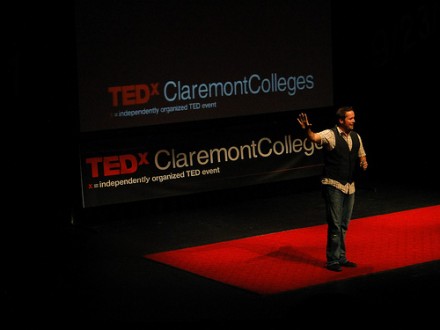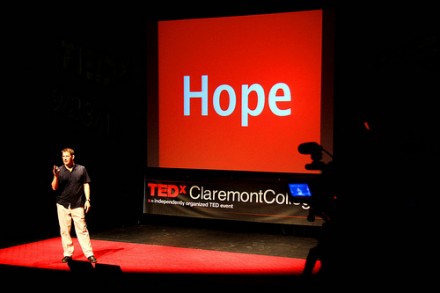"Friending the Future" TEDx Conference Comes to Claremont
September 28, 2011
Ratik Asokan

Thanks to the hard work of Jason Soll, Brian Hoffstein, John-Clark Levin and their team, the Claremont Colleges became the latest addition to the TEDx intellectual committee last Friday, September 23. The technology, education and design organization (also known as TED), is a non-profit group that conducts fascinating and informative talks at various venues around the world, centered around the mantra of "ideas worth spreading." TEDx talks are independent events based on the model of and with the backing of the TED group and organized by people around the world. If you are anything like me, you'll have probably clicked around the TED website at some point in your life. If you have not (and I highly recommend you do), you'll find quite the treasure trove of diverse topics and speakers. On Friday, September 23, Seaver Theatre was full of excitement and intellectual curiosity. The captive audience heard ideas from six speakers and watched two videos from previous TED talks. The theme for the evening was "Friending the Future." The chosen speakers were people who not only excelled in their respective fields but also channeled their work in a way that they could give back to society.
Gordon Zacks, the first speaker of the night, is a leading industrialist and Chairman of the R.G Barry Corporation. He spoke about the lessons that he learned from his father and his business on humility, adaptability and stability. Zacks noted, "The most important thing you can learn about yourself is your limitations." He continued, "The leader, the manager has to be able to say, I don't know... what do you think." Zacks reminds us that we need to focus on how our actions--as students, colleagues, and even future CEOs--can help others. The next speaker was someone who's work does just that.

Medicine is all you need to cure disease right? Apparently not, according to Doctor Karl Haushalter, a professor at Harvey Mudd, a pioneer in AIDS research and a man whose moving words reflect his unrelenting passion for the work he does. Haushalter stressed the importance of social involvement involved in the treatment of AIDS and opened our minds to a whole new aspect of medicine.
Allen Proctor, an ex-Chief Financial Officer for Harvard University and expert in the non-profit sector, spoke next about the fallacies people have regarding the non-profit sector and of the importance of the sector itself. He noted that the role of non-profits is to be reliable providers of community needs as long as the private sector cannot do it.

Anyone called 'Doctor Love' is obviously doing something correct with his life, and indeed Paul Zak (the next speaker) is. Zak is a professor of Economics and the Department Chair and Founder of the Center for Neuroeconomic Studies at Claremont Graduate University. He studies the effects of oxytocin and testosterone on human behavior and, with his prescriptions like "hug at least eight people a day", Zak seemed like a cross between a scientist and Ziggy Marley. His other challenge to the audience was to perform at least one random act of kindness a day. One noteworthy piece of advice that he gave was to try going on a roller coaster on a first date. He claims, "it's like three dates in one."
The last two talks of the evening had the largest impact on me, personally (in no small part because of my own struggling attempts at gardening and music). Jesse Dubois, the penultimate speaker, is an LA based urban agriculturalist whose team converts personal gardens and yards into little self-sustaining organic farms through a process called 'farmscaping'. The night concluded with Mateo Messina, a Grammy-winning musician talking about his passion for music, and how it drives him to give back to society. Messina believes his job is about "cuing" emotion through music. He incidentally cannot read a note of music (Jimmy Hendrix couldn't read music either, OK guys?), and yet has composed and conducted symphonies and even written a number of film scores. Messina played a clip of himself performing Kashmir by Led Zeppelin, with an all-girls student choir and the the rock band Alice in Chains. He also scored the music for Juno.
The show also included two video talks from previous TED events. Eli Pariser, President of MoveOn's board and fellow at the Roosevelt Institute, spoke about the impact of Google and internet search engines on what type of information we see online. Deb Roy, an Michigan Institute of Technology professor, spoke about social connections by analyzing television and Tweeted reactions. He also installed videocameras and videotaped his home for six months, studying social connections and capturing the first months of his son.
Jesse Dubois's company has one hundred clients; Gordon Zacks owns a huge footwear company. These two speakers come from extremely contrasting backgrounds and yet their talks shared the theme of inspiration. All the speakers at the event taught us that we can help create a better future while having extremely satisfying careers. Talks such as these show us that people can combine both success and meaning in their life. Also, the talks were just plain interesting.
The talks brought like-minded Claremont students together for some intellectual engagement. Students learned by personally interacting with the speakers and with one another at the informal discussion sessions. It is a shame that not all applications were accepted as some seats were empty. The talks were a sheer delight and for many to have missed them seemed a waste. The lack of female speakers was also quite clear and organizers would do well to work them into the program at a future event.
Overall, the event was a resounding success. A good talk leaves the listener with a sense of awe and happiness that they have learned something. That is exactly what the TEDx talks did for me. From music to retail to agriculture to psychology, the audience was taken on a journey through the lives of people who have seen great success and are using their talents to help create a better future. The talks were inspirational; one can only hope that we live such successful lives after Claremont.




